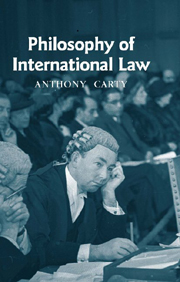Book contents
- Frontmatter
- Contents
- Preface and Acknowledgments
- 1 What Place for Doctrine in a Time of Fragmentation?
- 2 Continuing Uncertainty in the Mainstream
- 3 International Legal Personality
- 4 The Use of Force
- 5 American Legal Cultures of Collective Security
- 6 Marxism and International Law
- 7 Resistances to the Neoliberal International Economic Order
- 8 From an Order of Fear to One of Respect
- Index
4 - The Use of Force
Published online by Cambridge University Press: 12 September 2012
- Frontmatter
- Contents
- Preface and Acknowledgments
- 1 What Place for Doctrine in a Time of Fragmentation?
- 2 Continuing Uncertainty in the Mainstream
- 3 International Legal Personality
- 4 The Use of Force
- 5 American Legal Cultures of Collective Security
- 6 Marxism and International Law
- 7 Resistances to the Neoliberal International Economic Order
- 8 From an Order of Fear to One of Respect
- Index
Summary
The Classical International Law Tradition
In his magisterial introduction to international law, The Law of Nations, James L. Brierly quotes at length the French international lawyer Albert De Lapradelle on the significance of Vattel, whose text Le Droit des gens, published in 1758, is usually regarded as the standard founding statement of modern international law. The Frenchman praises Vattel for having written in advance of the events which the book represents, the principles of 1776 and 1789, of the American and French Revolutions. Vattel is credited with projecting onto the plane of the law of nations the principles of legal individualism. Vattel has written the international law of political liberty.
Brierly comments astutely that the survival of the ‘principles of legal individualism’ has been a disaster for international law. The so-called natural independence of states cannot explain or justify their subjection to law and does not admit of a social bond between nations. Vattel has cut international law from any sound principle of obligation, damage which has never been repaired.
It could be said that there is nothing in the critical legal studies movement about the law relating to the use of force that has not already been said clearly by Brierly in relation to Vattel. Brierly's views are worth repeating precisely because contemporary statements about Anglo-American unilateralism, above all in the context of Afghanistan and Iraq, however worthy and true, are statements of the obvious which do little to advance understanding.
- Type
- Chapter
- Information
- Philosophy of International Law , pp. 110 - 139Publisher: Edinburgh University PressPrint publication year: 2007



